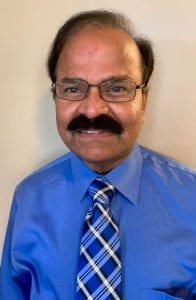DR. MARK BASKARAN
CV
Full resume-21May2019_Baskaran.pdf
BIOGRAPHY
Dr. Mark Baskaran is a tenured Full-Time Professor and Chair in the Department of Geology at Wayne State University (Detroit, Michigan). He received his Ph.D. in Physics from Physical Research Laboratory (PRL), a premier research institution in India. After his Ph.D., he spent 2 years at PRL as a postdoctoral fellow before he moved to the Institute of Marine Science at the University of Alaska (Fairbanks, Alaska). After a year, he joined Texas A&M University (Galveston, Texas) where he taught introductory Physics and Geology courses at the Department of Marine Sciences, while conducting research related to atmospheric fluxes of radionuclides, mobility of radionuclides in groundwater, scavenging and particle cycling in marine environment and dating of recent sediments and carbonates. After his 11 year career as a teacher and researcher in Texas, he joined Wayne State University where he became a tenured Full Professor in 2007. He teaches both introductory level courses in Oceanography, Meteorology, and Physical Geology as well as upper level courses including Chemical Fate and Transport of Pollutants, Nuclear Geology, and Environmental Geochemistry.
Professor Mark Baskaran has published over 145 peer-reviewed articles (with over 6900 Google Scholar cumulative citations, h-index 50 in January 2019), most of which are related to the applications of isotopes as tracers and chronometers in Earth systems. He edited a two-volume Handbook entitled “Handbook of Environmental Isotope Geochemistry” with forty articles contributed by eminent scholars in the field in 2011, published by Springer. He also published a monograph on radon entitled “Radon: A Tracer for Geological, Geophysical and Geochemical Studies”–Springer 2016. He spent three months as a Senior Fulbright Scholar at Ege University (Izmir, Turkey) in 2015. He has given invited and plenary talks/seminars at over sixty national/international conferences, workshops, universities and research institutions around the world. He serves as an Associate Editor for two Elsevier journals, Journal of Environmental Radioactivity and Estuarine, Coastal, and Shelf Science.
Dr. Baskaran’s research work includes all subsystems of the Earth system. He has extensively collaborated with a large number of researchers from universities and institutions around the world. His work with marine systems (estuarine, coastal, shelf and open-ocean) on the investigations of particular organic carbon export, particle cycling and remineralization and colloidal thorium scavenging in the Arctic Ocean, Gulf of Mexico, North Atlantic and East Pacific were funded by several funding agencies in the U.S. that include the National Science Foundation (NSF), National Oceanic and Atmospheric Administration (NOAA), and the Department of Energy (DOE). He has been funded by NSF as a part of the U.S. GEOTRACES group in four phases (Intercalibration, North Atlantic, East Pacific and Western Arctic Ocean sections). He has served as a Chief Scientist in six major oceanographic expeditions in the Gulf of Mexico and Arctic Ocean.
He convened a National Workshop entitled “Recent Changes in the Biogeochemistry of the Great Lakes System” in March 2013 at Wayne State University. He also had convened a number of sessions and meetings at both national and international conferences and workshops. Currently, he serves as the inaugural Chair (2017-2019) of the Devendra Lal Memorial Medal Selection Committee, a union-level award at the American Geophysical Union.
Dr. Baskaran resides in Troy, Michigan with his wife, Rachel Baskaran. They have three grown-up children.

